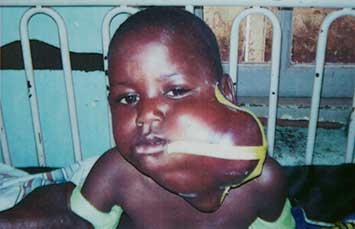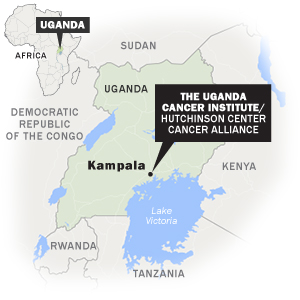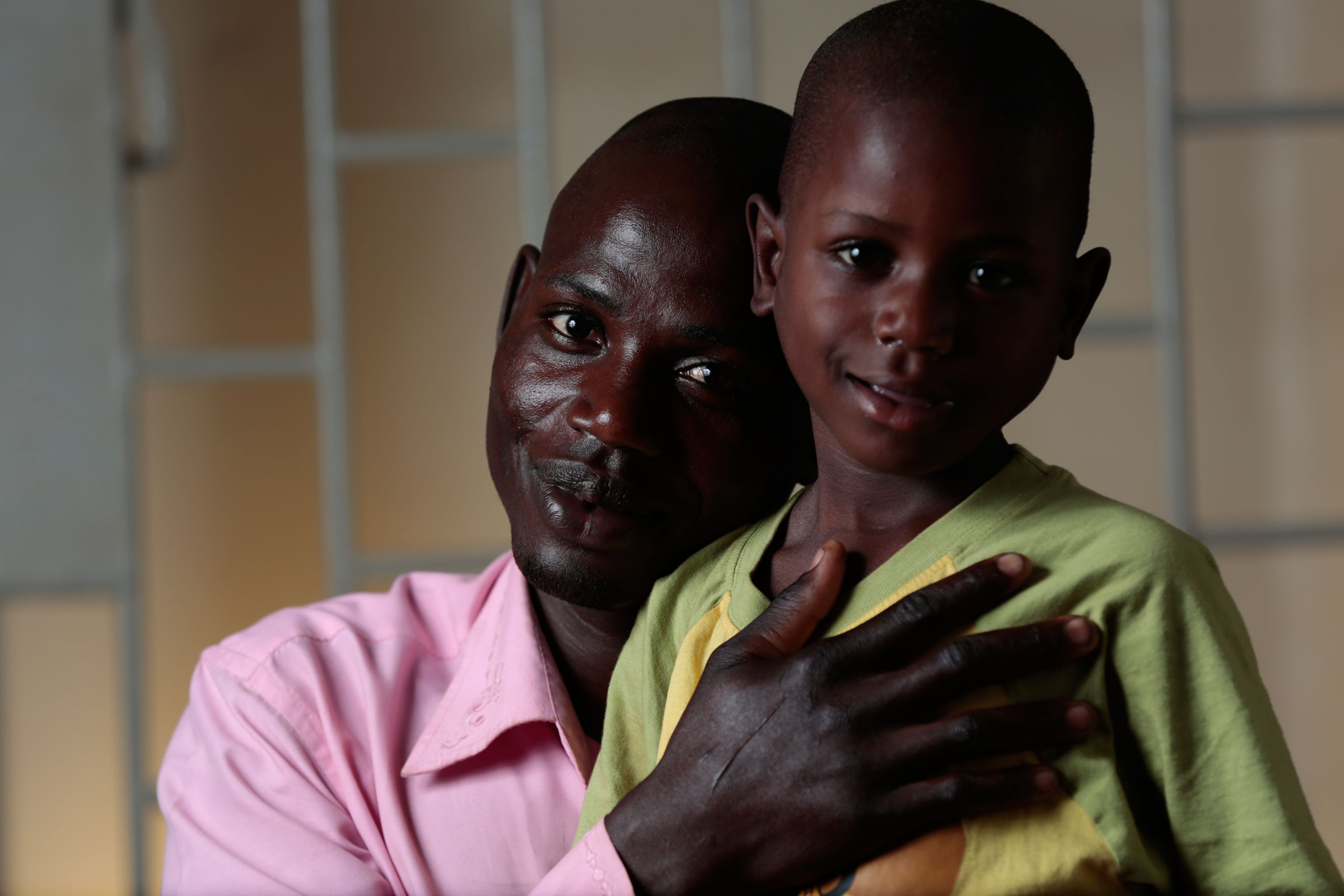Editor's note: Staff writer Mary Engel and photographer Robert Hood travelled to Uganda to report on the work of Fred Hutch's Program in Global Oncology and the Uganda Cancer Institute, particularly in the area of infection-related cancers.
KAMPALA, UGANDA -- Looking at the bright-eyed boy sitting on his father’s lap at the Uganda Cancer Institute, it’s hard to believe that Mike Kiragga once had a tumor on his jaw so huge he couldn’t turn his head.
Looking at the love on Ronald Lumala’s face as he cuddles his 4-year-old son, it’s impossible to believe that 18 months ago, he’d thought about giving up on the child and letting him die.
The third of four children, Kiragga had Burkitt lymphoma, one of the fastest growing cancers and the leading cause of cancer deaths in children in sub-Saharan Africa—but one that is highly curable if treated in time with chemotherapy.
But Lumala, a farmer from a small village in west-central Uganda, originally had his own explanation for the mysterious swelling that first appeared in December 2012: He feared that Kiragga had been bewitched.
How else to explain a lump that kept growing and growing? No one in his village had seen anything like it, and his neighbors agreed that witchcraft was involved. They became even more convinced when, about two months after the swelling began, Lumala’s father — Kiragga’s grandfather — was suddenly killed in a car crash.
Trading goats for care

After Mike Kiragga developed a mysterious lump that kept growing, his father feared a hex had been put on the family.
Even before that tragedy, Lumala said, speaking in Luganda as his case manager at the UCI translated, he had been taking his son to traditional healers, trading goats for care. Nothing helped.
The last healer he consulted wanted to cut off the lump and burn it. Something about that didn’t make sense to Lumala. He could feel the lump, and it was hard, like a stone, not something that could be drained by cutting.
So he decided to try his village medical clinic, which referred him to a regional hospital. Doctors there told him he should go to Mulago Hospital, the nation’s largest, in Kampala, but they didn’t say why.
His neighbors were skeptical: People who went to the big hospital in Kampala never came back alive, they said. But Lumala went anyway, taking his son by boda-boda taxi and taxi-van, bearing a letter from the regional hospital recommending that the tumor be biopsied.
After waiting a week to see a doctor, sleeping at night on the hospital grounds, they had just reached the front of the line when Lumala got the phone call telling him about the car crash. Son and grandson rushed back to their village, Kigalama, about 50 miles away, for the burial.
The car crash seemed to confirm that a hex had been put on the family. That’s when Lumala, already distraught over his father’s death, descended into despair. But his mother — Kiragga’s grandmother — didn’t care what the neighbors said. This could be an English disease, not a traditional one, she told Lumala. “Go to Kampala,” she said.

Lumala returned with the boy and the grandmother while the boy’s mother stayed at home with the other children. Doctors at Mulago Hospital let him take his place again at the front of the line, did the biopsy and sent him straight up the hill to the Uganda Cancer Institute.
There he met Susan Nabakooza, a UCI nurse who also works as a case manager for the Burkitt Lymphoma Project, a joint initiative of the UCI and Fred Hutchinson Cancer Research Center. With Nabakooza’s guidance, Kiragga was admitted to the UCI and treated for his fever and pain. Once the diagnosis was confirmed, he was immediately started on chemotherapy.
It was Feb. 13, 2013. Virtually overnight, the tumor shrank by almost half.
Kiragga spent two weeks as an inpatient at the UCI, where he was closely monitored. He was given his second dose of chemotherapy, and the tumor shrank yet again. He was discharged and his father was told to return again every two weeks until the full regimen of six treatments had been completed.
Chemotherapy can have an immediate, almost miraculous effect on Burkitt lymphoma. Paradoxically, the rapid response can trick families into thinking the cancer is cured, and some don’t return for the rest of the treatment, allowing the cancer to rebound and lessening the chances of a cure. One of many tasks of case managers is to contact the families and remind — and cajole — them to keep their appointments.
Lumala didn’t need cajoling. He brought Kiragga back faithfully, even if it meant selling extra produce or chickens to raise money for his travel expenses. The project also helped with transportation costs.
'Every time he sees the child he is just so happy'
To express his gratitude, he often brought Nabakooza groundnuts, or peanuts, a staple food grown by small farmers.
“He never believed he would have that child back,” said Nabakooza. “He just came [to UCI] because his mother said to go. Now every time he sees the child, he’s just so happy.”
Kiragga completed his cancer therapy in in May 2013, and he continues to come into the UCI for follow-ups. There is no sign of the cancer.
Back in the village, Lumala’s neighbors acknowledged that it was not witchcraft after all but an “English illness.”
One that is curable.
